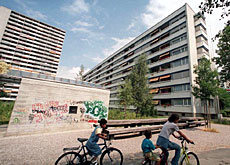Swiss happy with tenants’ rights

Swiss voters - most of whom rent their homes - seem happy with the rights and protections afforded to tenants.
On Sunday they threw out an initiative which would have keep rent increases in check and imposed tougher restrictions on landlords.
Some 70 per cent of the population lives in rented accommodation. And nearly 70 per cent of those who voted in Sunday’s ballot rejected an initiative that would have greatly strengthened their position as tenants.
The initiative aimed to tip the balance in favour of tenants, leading to lower monthly payments and greater rights for those who rent their homes.
For one, tenants would have been protected from rent increases if the property changed hands during the term of the rental agreement.
The initiative also promised to protect tenants from the whims of landlords by preventing owners from serving notice on tenants without good reason.
This would have meant the property owner would not be able to throw out one tenant in favour of another willing to pay more rent.
The initiative’s sponsors – Switzerland tenants association – argued that people spend on average 26 per cent of their annual salary on rent, and are entitled to a better deal.
“Unfair mechanism”
The main bone of contention in the current law is a mechanism that links mortgage interest rates to the amount of rent a landlord can charge for a property.
The Social Democrat parliamentarian, Rudolf Strahm, who is president of the tenants association, says the mechanism is unfair. He explains that it is the tenants who bear the brunt of rises in interest rates.
“When the interest rates go up, rents rise quickly,” Strahm told swissinfo.
However, he says, when the rates fall, landlords do not necessarily reduce the rent.
“The rents remain high and this leads to a disadvantage for the tenants.”
The initiative suggested abolishing the “floating” interest rate and using a five-year average figure to determine rent increases and decreases.
Strahm said this would have given tenants “more stability and security” by removing the possibility of sudden price rises, which can be as high as ten per cent.
Just say no
But the Swiss government called on people to vote no, admitting that while the law needs improving, the initiative was not the best approach.
The economics minister, Joseph Deiss, told swissinfo that the initiative simply proposed amending the mechanism and that this wouldn’t work.
“Studies show now that this is an efficient way to bring rent protection to tenants.”
Instead, the government has its own plans to amend the current law, namely by pegging rent levels to the cost of consumer goods.
Deiss argued too that the fair-rent initiative would have put potential landlords off investing in the housing market and would be against the interests of tenants.
Housing shortage
Decreasing investment in the housing market would no doubt exacerbate an already critical situation in cities like Zurich, which is experiencing a severe shortage of accommodation.
Many would-be tenants have already been priced out of the market in Switzerland’s most populous city. Last autumn, there was one empty flat for every 2,500 that were occupied.
swissinfo, Faryal Mirza
The “yes-to-fair-rent” initiative aims to bring rents down and give tenants more rights.
The government is opposed to the initiative and proposes to amend the law itself.
Both proponents and opponents of the initiative agree the current law needs changing.

In compliance with the JTI standards
More: SWI swissinfo.ch certified by the Journalism Trust Initiative

You can find an overview of ongoing debates with our journalists here. Please join us!
If you want to start a conversation about a topic raised in this article or want to report factual errors, email us at english@swissinfo.ch.